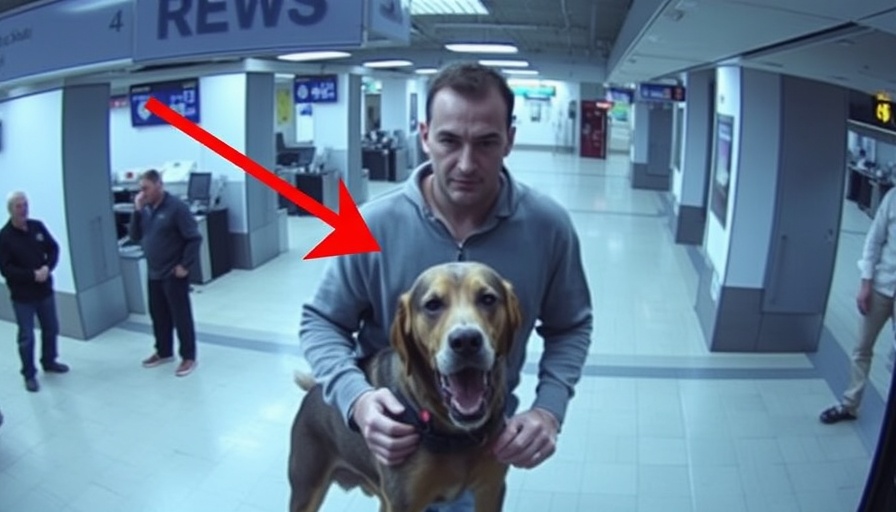
The Disturbing Case of Animal Cruelty at Orlando Airport
A troubling story has captured the attention of locals and animal lovers alike: a warrant has been issued for a woman accused of drowning her dog in an Orlando Airport bathroom after she was denied boarding on a flight due to inadequate paperwork. This shocking incident has raised many questions about animal welfare, and has sparked an outcry from the community.
In 'Warrant issued for woman who drowned dog in Orlando airport bathroom,' the discussion dives into the shocking particulars of this case, prompting us to explore the deeper implications and community reactions.
Unfolding Events: From Airport Incident to Courtroom Drama
In March, news broke about the heartbreaking discovery of a nine-year-old miniature schnauzer found deceased in the trash at Orlando International Airport. The accused, Alison Lawrence, reportedly drowned her pet because she could not take her onto an international flight. Surveillance footage and trash can evidence linked Lawrence to the crime. Following her failure to appear for a court hearing, a warrant for her arrest has now been issued.
The Legal Consequences of Animal Cruelty
Alison Lawrence faces serious charges, including felony animal cruelty and tampering with physical evidence. The legal ramifications of such actions are significant, reflecting society's growing intolerance toward animal mistreatment. Florida law outlines penalties for animal cruelty, which can include prison time and hefty fines. This incident is not just a criminal matter; it’s a call for stronger measures to protect animals in vulnerable situations.
The Community’s Reaction and Call for Change
Local residents and animal advocacy groups have expressed outrage over the incident. Pet lovers have rallied to raise awareness about animal rights and the responsibilities that come with pet ownership. Many are calling for legislative amendments that would tighten regulations around flying with pets, ensuring better protection and welfare standards at transportation hubs.
Understanding Airport Policies Regarding Pets
Seeing this incident unfold raises broader questions regarding the treatment of animals in travel scenarios. Airports have specific policies on traveling with pets—anyone wishing to board with a pet must often provide pertinent documentation such as vaccination records and health certificates. A void in knowledge regarding these regulations can lead to tragic outcomes, as illustrated by the case of Lawrence.
Animal Welfare Organizations Respond
Organizations such as the Society for the Prevention of Cruelty to Animals (SPCA) have responded to this incident, reminding pet owners of the importance of planning and understanding travel regulations. They emphasize that resources are available to help individuals safely travel with their pets, and they advocate for stricter enforcement of animal protection laws.
Future Predictions: Stricter Regulations Ahead?
Given this tragic incident, it is reasonable to predict that greater scrutiny might come from both airlines and animal welfare advocates in the near future. Changes to policies regarding animal travel may arise, potentially incorporating more stringent requirements for documentation and improved training for airport employees on how to handle pet-related situations effectively.
Historical Context: A Pattern of Animal Cruelty?
This incident draws attention to a pressing issue faced by many communities: recurring cases of animal cruelty. While the vast majority of pet owners care deeply for their animals, isolated incidents of cruelty point to a more considerable problem regarding awareness and education. Therefore, remembering these heartbreaking events might help in creating a conscientious dialogue surrounding responsible pet ownership. Public awareness campaigns could prove essential in changing perceptions and behaviors.
Local Perspectives and Emotional Insights
The emotional weight of this story highlights the deep bond many share with their pets. For many residents, the thought of a beloved animal suffering can be triggering and evinces a need for community solidarity. Collective mourning over the loss of an innocent life often brings people together, igniting discussions about empathy, compassion, and the laws that govern animal rights.
Conclusion: A Call for Community Action
As details continue to surface regarding this alarming case, it serves as an urgent reminder for community members to advocate for animal welfare in all areas, including travel. Individuals can empower change by reporting suspected animal cruelty, supporting local shelters, and engaging with organizations that champion the rights of animals. The community’s voice can forge the path to stronger protections and, ultimately, a kinder world for all living beings.
 Add Row
Add Row  Add
Add 




Write A Comment